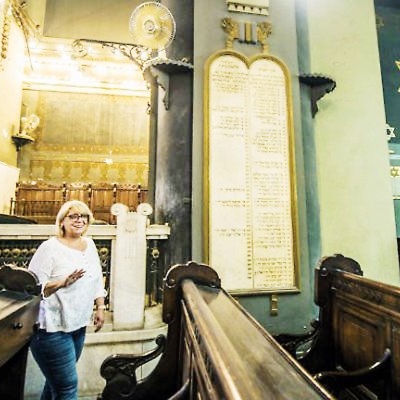
Religion

Egyptian Jews after the exodus fearful and needy
TALI FEINBERG
There are a few community members left in Cairo, but outside of those two cities, Jewish life in Egypt is non-existent.
According to the World Jewish Congress, the Jewish population in Egypt topped 80 000 people in 1948. This was followed by a decade-long decline, mainly because of the establishment of the state of Israel, during which Egyptian Jewry dwindled to near extinction.
Both synagogues in Egypt – Sha’ar Hashamayim and Eliahu Hanabi – are Sephardic and orthodox leaning. There is no official rabbi in the country, and kosher food is extremely scarce. Yet, there are many Jewish historical sites throughout Egypt, including the Maimonides Synagogue and Bassatine Cemetery in Cairo. The latter is considered one of the oldest Jewish cemeteries in the world.
In 2013, Egyptian Jewish community leader Magda Haroun told the Egyptian Independent, “I used to say a lot that [my late sister] Nadia and I will be the ones to close the door on the history of Jews in Egypt… the burden is heavy. The elderly live in fear because of the [prevailing] image of Jews as traitors and spies. They fear people finding out they’re Jewish. I fear I will not be able to provide them with a decent ending to their lives, or to fulfil my pledge to safeguard the Jewish legacy and restore it. This legacy is part of me as an Egyptian Jew.”
Her predecessor, Carmen Weinstein, passed away in 2013, and her death was heavily covered in Egyptian newspapers. President Mohamed Morsi, in a statement published in The New York Times, mourned Weinstein as a “dedicated Egyptian, who worked tirelessly to preserve Egyptian Jewish heritage and valued, above all else, living and dying in her country, Egypt”.
Weinstein succeeded her mother in 2004 as the leader of the community. Since the late 1990s, the community has been headed by women as the male population has dwindled.
Speaking to The Cairo Scene, Haroun said, “There used to be no anti-Semitism in Egypt. Many Jews came here from European and Arab countries because it was a tolerant, abloom place, it was a society that accepted everyone.”
From fashion to cinema, Jews were at the top of their respective industries making sizeable contributions to the development of the country. “It is partially thanks to Jewish families like Mosseiri, Rolo, and Sawares that we even have a banking sector”, reported the paper.
“Minorities tend to excel, they always want their kids to be the best, as far as education and such. I’m not boasting, but many of the best scientists, doctors, economists, and businessmen are Jewish; they want to be the best they can be,” said Haroun.
Thinking back to the “Arab Spring” uprisings that took down dictator Hosni Mubarak, Haroun says: “That year was both a blessing and a curse. A blessing because the Egyptian people now know who their rulers were, and know about their fascist dictatorship. But also a curse because of the economic problems Egypt faced that year.
“But there is still a chance to fix things. The Jewish community in Egypt has donated money to the Support Egypt Fund in spite of its difficult living conditions. All members of the community have agreed to contribute to the fund. Hopefully, a new phase in the history of Egypt will begin, one where there will be no difference between Muslims, Christians, and Jews. I hope this good spirit returns, and we build our country together.”
Haroun is also concerned about the determination of Jewish property in the country. “So far, I do not have all the required documents for that, and I also fear my position will be politicised even though it is purely humanitarian,” she said.
But she insists that, “The Jewish synagogue has to remain open and receive people just like mosques and churches. If there are security concerns that result from ignorance, such as fears that someone might walk into the synagogue and bomb it thinking he will go to heaven, the whole of Egypt will lose.
“Everyone should be open to everyone. I hope that one day, I will see a Jewish Museum in Egypt, one that will contain artefacts and tools of daily life so that people will learn that we are not different. We eat, drink, and pray, and have common traditions even when it comes to burial rituals. Coming generations need to know that we were part of this country. We have Islamic and Coptic museums, and I hope there will be a Jewish one.”
Haroun has an encyclopaedic knowledge of Cairo’s remaining Jews-“My babies, I call them” – their health, their living situation, and the health of their children. She is anxious to give the remaining Jews in Cairo proper burials. She would like to hire a rabbi. For all of this, she needs the approval of the Egyptian government – and money.
Soon after she was elected president, she wrote a letter to the Shura Council demanding that the interim government reinstate a monthly allowance of 7 400 Egyptian pounds (about R14 950) for the Jewish community, which Morsi had abolished.
“We explained that it’s a duty in Islam to help the needy, and these people are needy,” Haroun said. “And it’s an honour for the Egyptian government to take care of these old women who refuse to leave the country. Although they have family all over the world, they want to die here.”




